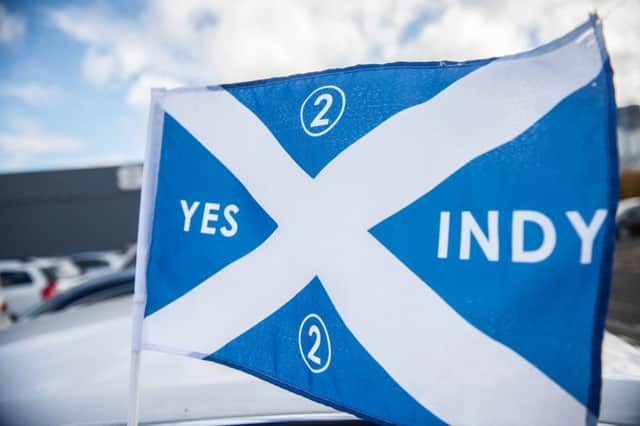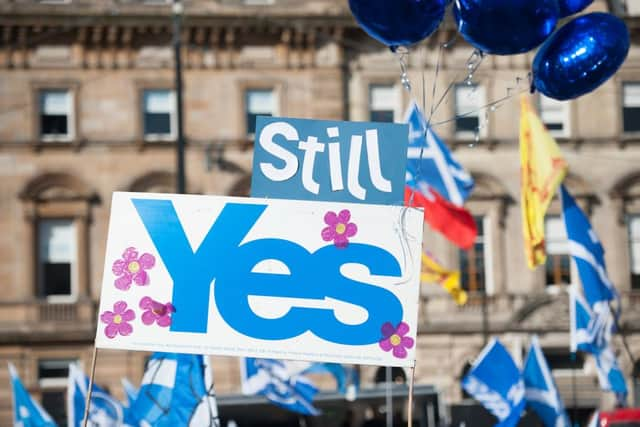How likely is a second Scottish independence referendum?


The collapse of Northern Ireland’s power-sharing Government, and the continued wrangle over exactly what shape, size, or colour of Brexit Britain will pursue, both rank higher on the agenda than a rerun of September 2014.
But make no mistake, it is a very real possibility. The lofty ‘once-in-a-generation’ talk by Nicola Sturgeon and others that balmy Commonwealth summer are now a distant memory.
Advertisement
Hide AdAdvertisement
Hide AdThe shock Brexit vote has handed those willing a ‘material change’ in Scotland’s circumstances the perfect trigger for another plebiscite.


For the First Minister, who long warned that another referendum could follow Scotland being ‘torn out of the EU against our will’, the polling picture looks decidedly bleak.
Support for independence itself hasn’t been buoyed by last June’s Brexit vote, though it bears noting that the full impact of the decision, economic and political, won’t be borne out until after Article 50 is triggered at the end of next month.
A poll released over the weekend shows that support for Ms Sturgeon’s dream of a separate Scotland commands the support of just 43% of likely voters.
But perhaps the more important consideration is whether the SNP can call a referendum, itself the topic of fierce debate.


The short answer is that Holyrood can call a referendum on any matter it sees fit.
However, unlike 2014’s vote, the result would not be legally binding.
Ahead of that referendum, the SNP and the Tory/Lib Dem coalition were able to put pen to paper on a joint document, “The Edinburgh Agreement”.
Advertisement
Hide AdAdvertisement
Hide AdWhile not the Declaration of Arbroath, the agreement was significant in that it temporarily transferred responsibility for the vote to the Scottish Government.


That meant for a far smoother process, but for a time in 2012 the UK and Scottish Governments were at loggerheads over whether the SNP could call a referendum on their steam.
If a week is a long time in politics, then five years is a veritable lifetime. Cameron and Salmond, Edinburgh Agreement signatories, have left high office, chastened by referendum defeats.
It is left to their successors May and Sturgeon to pick up the cudgel of Scotland’s constitutional future.
Block


David Mundell, Scotland’s sole Tory MP and thus almost by default our Scottish Secretary, set the tone for the debate on another referendum, and it was a belligerent one.
The Dumfriesshire MP said point blank that the referendum shouldn’t happen, and struck the same note as his Scottish leader Ruth Davidson, warning of ‘Scot against Scot’ clashes.
In many ways, a Tory brake on another independence referendum, as symbolic would it be, is a dream scenario for Nicola Sturgeon’s SNP.
Strain your ears, and you can already hear the howls of outrage. “Tories blocking the will of the Scottish people”, is the likely, and effective battle cry should Theresa May stand firm.
Advertisement
Hide AdAdvertisement
Hide AdThere are huge dangers for the Tories in refusing to back another independence referendum, not least galvanising “soft” pro-yes Scots into campaigning for a Yes vote.
For one, should it end up in the UK’s Supreme Court, the Government could be dealt another blow like they were with Brexit.
It has been de rigueur in some quarters to assume that Nicola Sturgeon has overplayed her hand, and a gamble on Brexit sparking a pro-independence frenzy has backfired.
This is naïve. Not for nothing was she considered the breakout star of the 2015 UK General Election.
A consultative referendum might not have the same heft as the one held in 2014, but a similar turnout would still represent that much vaunted ‘will of the people’.
Catalonia, a place perhaps unrivalled over anywhere else bar Norway for fantastical nationalist comparisons to Scotland, also held a referendum on independence in 2014.
Arturo Mas, former regional President and very much the Catalonian Alex Salmond, is about to stand trial for his role in that vote, which went ahead despite a ruling it was unconstitutional.
While the image of Nicola Sturgeon in fetters heading to the Tower of London is unlikely to adorn our screens any time soon, there are still lessons to be learned.
Advertisement
Hide AdAdvertisement
Hide AdMas is greeted by thousands of supporters at court appearances, and his party remain confident that separatist sentiment will soar as the trial continues.
A similarly obtuse approach by Theresa May could see a rather less sunny independence movement given a much needed boost.